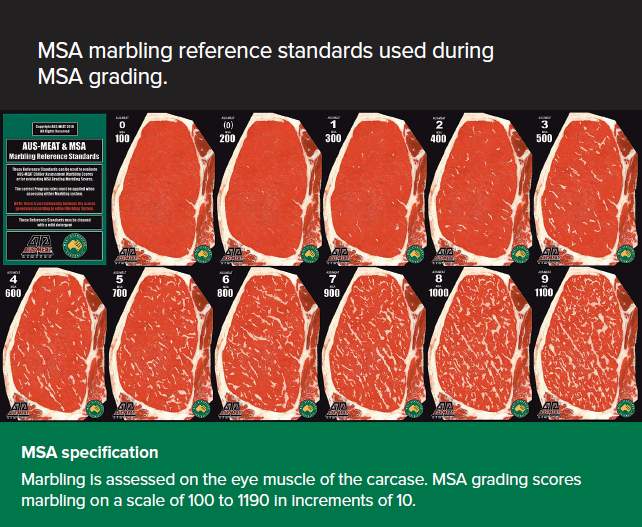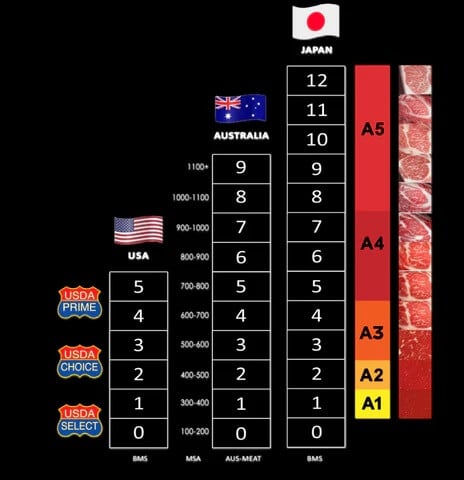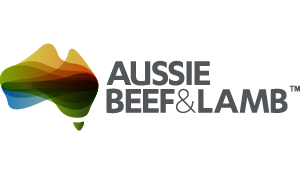What is Wagyu?
Wagyu—literally meaning "Japanese cow"—represents several cattle breeds originally developed in Japan with a genetic predisposition for producing extraordinarily marbled meat. These cattle were selectively bred over generations to achieve specific traits, particularly the ability to develop intricate networks of intramuscular fat.
While the roots of Wagyu lie in Japan, Australian producers have successfully established their own Wagyu industry, adapting Japanese breeding techniques to Australian conditions while maintaining the extraordinary quality that defines Wagyu beef.
The Science: Why Beef Marbling Matters
Marbling is the defining characteristic of Wagyu beef and the primary factor in the unrivalled eating quality of wagyu steak. Unlike other beef varieties where fat primarily accumulates around muscle tissues, Wagyu genetics facilitate exceptional fat deposition within the muscle fibres themselves, creating the distinctive webbed appearance when a wagyu steak is cut.
This intramuscular fat—assessed from the 5th or between 10th to 13th rib on the carcase—is the last fat to be deposited in cattle and the first to be utilized as an energy source when needed. Its development requires specific genetic predisposition combined with precise nutritional management throughout the animal's life.
Marbling potential can be adversely affected by growth restriction early in life, making consistent nutrition crucial throughout the animal's development. Stress or fasting pre-slaughter can also rapidly reduce marbling scores, highlighting the delicate nature of this prized quality indicator.
What makes this marbling so important? The science is clear: these fine fat deposits significantly enhance both tenderness and flavour through several mechanisms:
- The fat melts during cooking, creating self-basting effects within the meat
- The higher predisposition of fat deposits between the muscle fibres making the meat more juicy and tender.
- The unique composition of Wagyu fat—with higher proportions of monounsaturated fats—contributes distinctive flavour compounds
- The melting point of Wagyu fat is lower than in conventional beef, creating the characteristic "melt-in-your-mouth" sensation

Understanding Grading Systems: Australia vs. Japan
The Australian Approach
Australia employs two complementary systems for grading marbling in beef:
AUS-MEAT Marble Scoring System:
- Ranges from MB0 (no visible intramuscular fat) to MB9+ (extreme marbling)
- Used for commercial grading and international trade
- Provides clear benchmarks for producers and consumers
Meat Standards Australia (MSA) System:
- A more precise scale ranging from 100 to 1190 in increments of 10
- Used primarily for detailed quality assessment
- Allows for finer differentiation between marbling levels
Under these systems, most Australian wagyu beef averages between MB3-MB7, while premium Australian Wagyu can achieve exceptional scores of MB8-9+. These highest grades represent beef with remarkable marbling density and distribution.
The Japanese System
Japan evaluates Wagyu using the Beef Marbling Standard (BMS), which forms part of their comprehensive quality grading approach:
- BMS scores range from 1 to 12, with 12 representing the highest possible wagyu beef marbling
- Combined with other quality indicators (meat colour, fat colour, firmness) to determine letter grades
- The complete Japanese grading scale ranges from C1 (lowest) to A5 (highest)
- A5 represents the pinnacle of Japanese beef excellence
Comparing the Standards
While no direct formula exists to convert between these systems (as they use different assessment criteria), industry experts generally agree that:
- Australian Wagyu scoring MB8-9+ compares favourably with Japanese A5 Wagyu
- Both represent the highest echelon of beef quality globally
- Australian grading emphasizes consistency and objective measurement
- The Japanese system incorporates additional subjective quality factors
The Genetics Behind Excellence: F1 Wagyu to Fullblood
The genetic composition of Wagyu cattle significantly influences their marbling capacity and overall quality. Australian Wagyu beef cattle fall into several distinct categories:
- Fullblood Wagyu: 100% Wagyu genetics, with complete ancestry tracing back to Japan
- Purebred/F4 Wagyu: Minimum 93% Wagyu genetics (fourth-cross)
- F3 Wagyu: Minimum 87% Wagyu genetics (third-cross)
- F2 Wagyu: Minimum 75% Wagyu genetics (second-cross)
- F1 Wagyu: Minimum 50% Wagyu genetics (first-cross)
In Australia, beef must contain at least 50% Wagyu genetics to be labelled and exported as "Wagyu." While higher percentages of Wagyu genetics generally correlate with greater marbling potential, other factors including nutrition, stress management, and animal welfare practices also significantly impact the final quality.
Traceability and Quality Assurance
A distinctive feature of Australian Wagyu production is its comprehensive traceability system. Every animal is tagged with a National Livestock Identification System (NLIS) electronic tag containing a unique Property Identification Code. This "whole-of-life" electronic tracking enables complete transparency throughout the supply chain.
This traceability, combined with stringent quality assurance programs independently audited across all sectors of the industry, ensures that Australian Wagyu beef consistently meets the highest standards. These systems have been developed collaboratively between industry, government, and other stakeholders to maintain Australia's reputation for premium beef production.

(Source: The Wagyu Shop)
The Eating Quality Connection
Research conducted through MLA’s Meat Standards Australia program has demonstrated the significant impact of marbling on eating quality scores across different cuts. The effect is most pronounced in high-value loin cuts, where increased marbling correlates strongly with higher consumer satisfaction.
For example, increasing the MSA marbling score from 900 to 1100 can elevate a Wagyu steak from a grade 7 to grade 9 (equivalent to A5 Japanese wagyu) quality level. This relationship between marbling and eating quality reinforces why Wagyu commands premium prices in the marketplace.
However, it's important to note that marbling is just one factor among many that influence overall eating quality. High-quality cuts from young cattle with lower marbling can still deliver good eating experiences, while highly marbled cuts can fail to meet expectations if other factors are poorly managed.
Best Beef Steak in the World
The World Steak Challenge has recognised the quality of Australian Wagyu steak. Leading Australian beef producer, Jack's Creek, claimed the title of World's Best Steak in 2024 with their Purebred Wagyu Sirloin, marking their fourth win in ten years and second consecutive victory. The company's impressive performance included 17 medals overall, with 10 gold medals across various categories including fillet, ribeye and sirloin from their grain-fed Wagyu, Wagyu Cross, and Black Angus lines. This remarkable achievement highlights Jack's Creek's meticulous approach to beef production, and underscores Australia's growing dominance in the global market for Wagyu beef steak.
Best Beef in the World
Wagyu beef represents the pinnacle of premium beef production, commanding significantly higher prices than conventional beef due to its extraordinary marbling, tenderness, and complex flavour profile. However, the superior eating experience of Wagyu isn't limited to expensive prime cuts like ribeye or sirloin; secondary cuts such as featherblade (also known as flat iron or oyster blade), braising steak, and brisket still contain the characteristic intramuscular fat that defines Wagyu, making them excellent value alternatives that retain the breed's signature richness and tenderness when properly prepared.
These more affordable Wagyu options open a world of culinary possibilities for both home cooks and professional chefs looking to experience this premium product without the premium price tag. Featherblade, with its deep flavour and surprising tenderness when slow-cooked or reverse-seared, transforms into a remarkable dish that rivals more expensive cuts. Similarly, mince used in wagyu burgers delivers an extraordinary dining experience with its buttery texture and rich umami flavour, elevating a casual classic to gourmet status.
These accessible cuts benefit tremendously from Wagyu's genetic predisposition for marbling throughout the entire animal, allowing consumers to enjoy the distinctive qualities that make Wagyu special—the melt-in-your-mouth texture and complex flavour profile—while making this celebrated beef more accessible to a wider audience.
Our Where to Buy page lists out all the UK Distributors, Catering Butchers, Retail Stores and Restaurants who are stocking Australian beef.
The Future of Australian Wagyu
As global demand for premium beef continues to grow, Australian Wagyu is uniquely positioned to meet this demand with its combination of exceptional quality, consistent standards, and sustainable production practices. The industry's commitment to continuous improvement through genetic selection, nutrition research, and welfare-focused management ensures that Australian Wagyu will remain at the forefront of producing the best beef in the world.
With its reputation for excellence firmly established in international markets including the UK, Australian Wagyu represents not just a premium product but a culinary experience that showcases the perfect harmony between traditional breeding wisdom and modern production techniques.
For chefs, retailers, and discerning consumers in the UK market, Australian Wagyu offers an opportunity to experience the extraordinary qualities that make Wagyu the world's finest beef, produced to exacting standards that guarantee satisfaction with every bite.
Back to Blogs



